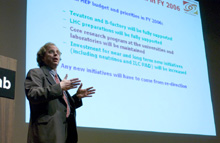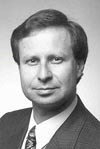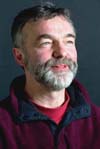 | Friday, April 8, 2005 |
|
Friday, April 8 8:30 a.m. Presentations to the Physics Advisory Committee - Curia II 3:30 p.m. DIRECTOR'S COFFEE BREAK - 2nd Flr X-Over 4:00 p.m. Joint Experimental Theoretical Physics Seminar - 1 West Speaker: U.-K. Yang, University of Chicago Title: Top Quark Mass Measurement at CDF
Monday, April 11 |
|
Extended Forecast |
Secon Level 3 |
|
Friday, April 8 Cream of Wild Mushroom Soup Blackened Fish Filet Sandwich $4.75 Southern Fried Chicken $3.75 Casserole Florentine with Italian Sausage $3.75 Eggplant Parmesan Panini $4.75 Pizza Supreme $2.75 Baked Potato Bar w/ Chili $4.75 The Wilson Hall Cafe now accepts Visa, Master Card, Discover and American Express at Cash Register #1.
Wilson Hall Cafe Menu |
| Fermilab Today is online at: http://www.fnal.gov/today/ Send comments and suggestions to today@fnal.gov Fermilab Today archive Fermilab Today PDF Version Fermilab Result of the Week archive Fermilab Safety Tip of the Week archive Linear Collider News archive Fermilab Today classifieds Subscribe/Unsubscribe to |
|
DOE's Staffin Envisions A Strong Fermilab Future | ||
| ||
|
Robin Staffin, the Department of Energy's Associate Director for High Energy
Physics in the Office of Science, assured a lab-wide audience Thursday that
Fermilab "will play a central and critical role for U.S. particle physics,
both here and abroad."
"We know that budgets have been very stressful, in carrying out our existing programs with the universities, and in planning for our future," Staffin told an assembly in 800-seat Ramsey Auditorium, as well as lab employees and users (with an estimated 250 off-site viewers) watching on streaming video. "But we're in this together, as partners," he continued. "I need your help in making a successful U.S. program and a successful Fermilab for our future. The two are inextricably linked...Yours is a great laboratory. That's always been the case in the past, and there's no reason not to see that as the case for the future." Staffin's talk addressed concerns over the reductions in the FY'06 budget request submitted by DOE to Congress in February, compared to FY'05 budget levels. He described Fermilab's growth within the funding agency as representative of its importance. "The laboratory is approximately 40% of the national DOE high energy physics budget," Staffin said. "This is up almost five percent from the late 1990s."
Staffin outlined three overarching goals for the field of high energy physics:
1) realize the full potential of the ongoing research programs — including the
Tevatron collider, the SLAC B-Factory, neutrino experiments, and contributions
to the Large Hadron Collider at Europe's CERN particle physics laboratory; 2)
develop a strong coherent experimental program in dark matter, dark energy and
neutrinos; and 3) use future LHC results to build a consensus for launching
the proposed Linear Collider. "The Linear Collider is the highest priority
for a future major facility in high energy physics," Staffin said, but he
added: "We will run the Tevatron as long as it makes sense to do so,
scientifically."
|
|
Press Release: Fermilab Colloquium Series Offers
Free Public Talks on World Energy
Situation Beginning Wednesday, April 13 As rising gasoline prices emphasize the U.S. dependence on oil, the Department of Energy's Fermilab will explore the present and future state of the world's energy situation, with
Opening the energy series on Wednesday, April 13, Dr. Steve Koonin, Chief
Scientist at BP International and former Provost of the California Institute
of Technology, will present "A Physicist's View of the World's Energy
Situation." Koonin will examine the challenge of ensuring adequate energy
supplies in an environmentally acceptable manner. He will focus on
technical, economic, and social considerations, suggesting possible
solutions and likely energy futures.
|
|
From Nature, April 6, 2005 Universe spawned stars at a young age by Andreas von Bubnoff Spitzer telescope reveals surprisingly robust early galaxies. The Universe's first stars were born a mere 700 million years after the Big Bang, far earlier than researchers previously thought. The discovery comes from images of stars in galaxies that are so far away their light has taken some 13 billion years to reach us. read more |
|
What's Up with the ILC? The entire International Linear Collider series is available online. Weerts updates Fermilab ILC community Last Wednesday, physicist Harry Weerts reviewed the latest International Linear Collider developments. Giving a presentation at the weekly Fermilab ILC meeting, Weerts summarized the presentations given two weeks ago at a Linear Collider Workshop at SLAC. Weerts shared with Fermilab physicists the main points given in a talk by Barry Barish, the newly-appointed director of the ILC Global Design Effort.
An important step at the SLAC workshop was the institution of a Detector R&D Panel, and Weerts added that "the accelerator design needs inputs from the physics and detector studies. The detector outline document is to be ready at the end of 2005 or early 2006. The next important step is the workshop in Snowmass in August." A crucial point in developing the ILC design is the discussion about the merits of two interaction points versus one. Two interaction points, one with a beam crossing angle of at most 2 mrad and one with at most 20 mrad, would allow for photon-photon collision experiments in addition to electron-positron collider operation. A committee is working on a document containing arguments in favor of or against two interaction points. Weerts emphasized that "experimenters should contribute to the accelerator design effort, not just the detectors." A lot of activity has focused on the development of the electromagnetic and hadronic calorimeters for the ILC detector(s). The goal is to obtain substantially better resolution than the LHC detectors. "We are pushing the technology, looking at calorimeter energy resolution better than ever achieved before. We do everything possible to get there," said Weerts, who works on ILC detector design.
One parallel session at the SLAC workshop was devoted to ILC communication issues.
Karsten Buesser, DESY, presented a proposal endorsed by Barry Barish and
communicators at the main particle physics laboratories to start a weekly
ILC newsletter. The majority of the content of the newsletter would be produced
by three dedicated ILC communicators, one each in Asia, Europe and North America.
"It's got to be a global effort with all three regions collaborating," said
Judy Jackson, director of Public Affairs at Fermilab. DOE's Office of Science
has already indicated that it would offer additional financial support for
the newsletter.
|
|
New Classifieds on Fermilab Today New classified ads have been posted on Fermilab Today. A permanent link to the classifieds is located in the bottom left corner of Fermilab Today.
Fermilab Folk Club Barn Dance
Fermi Singers
|


